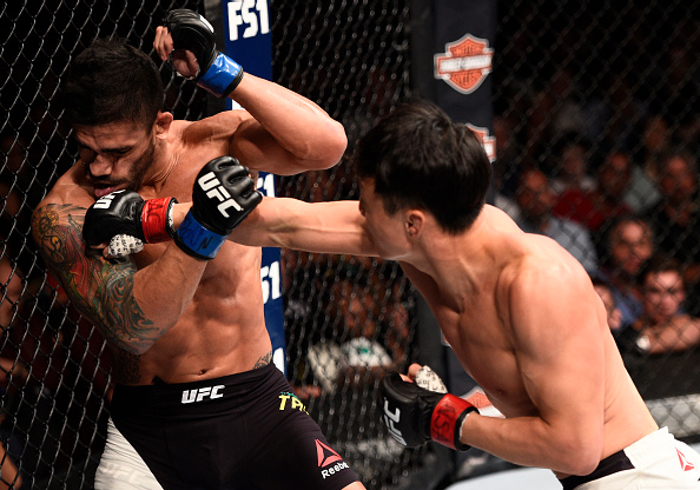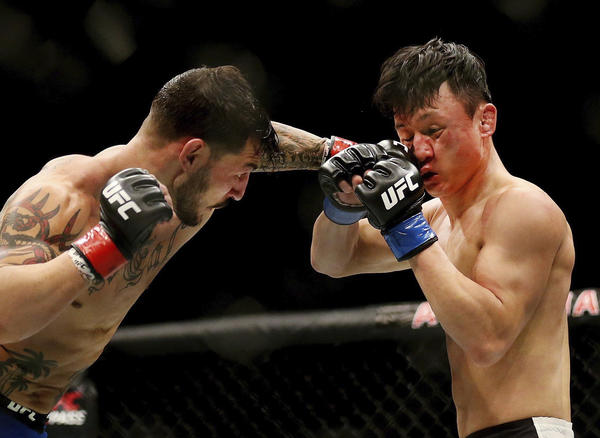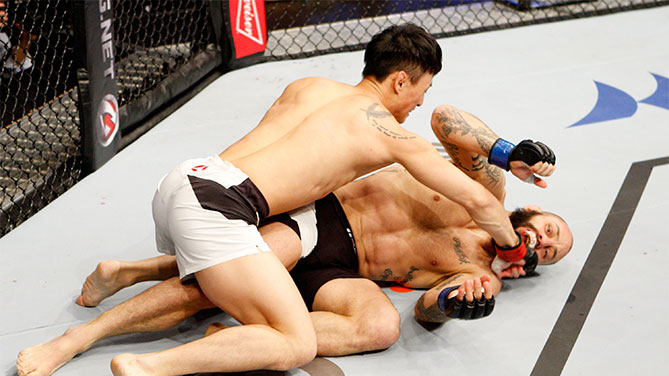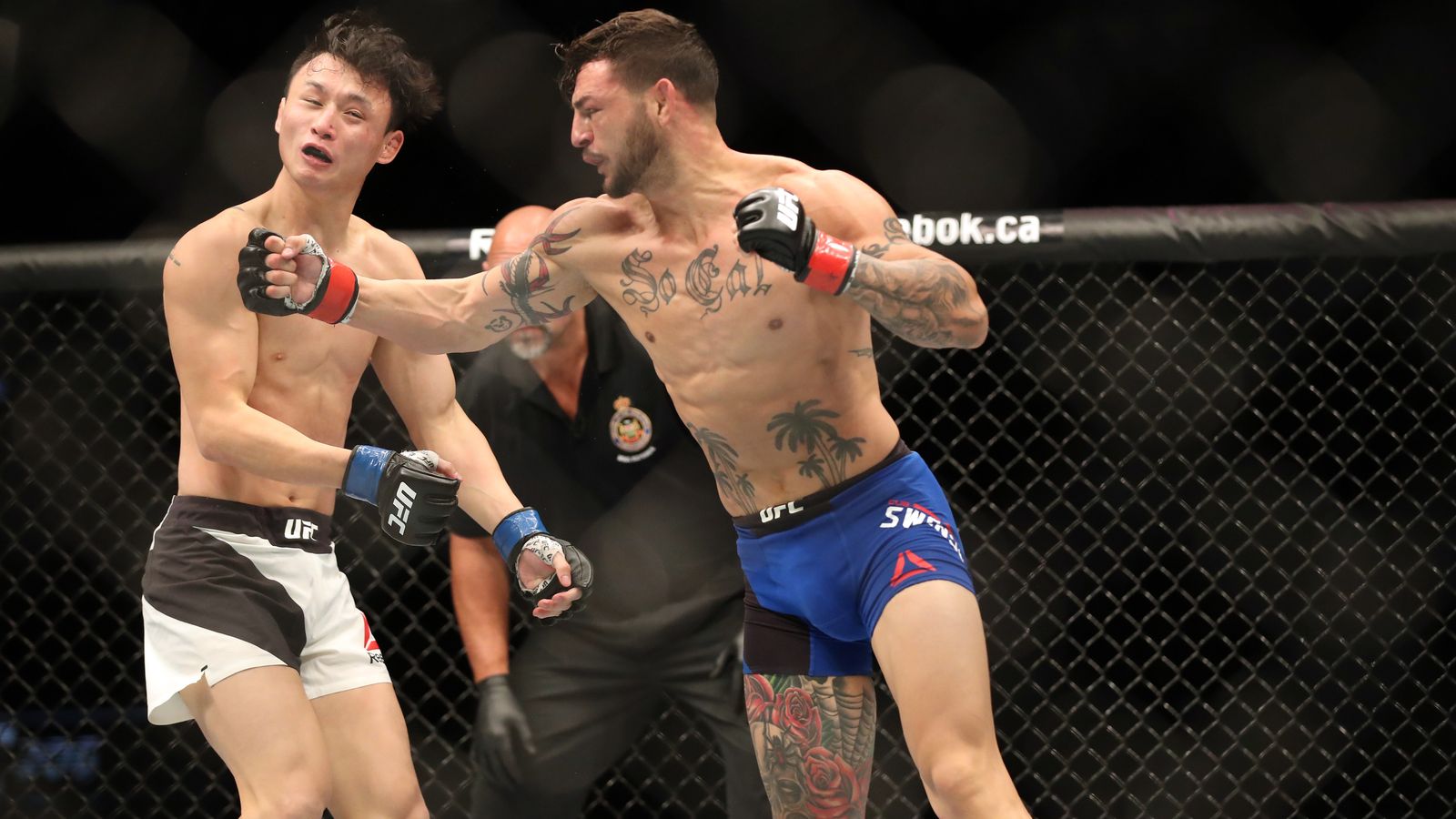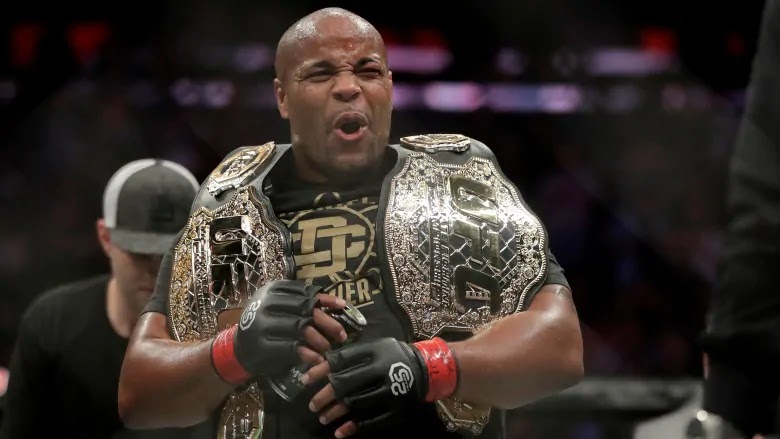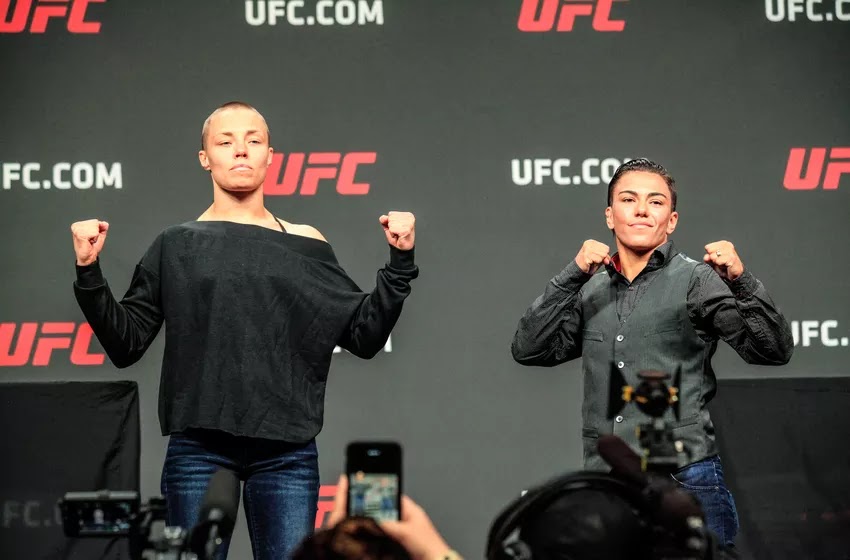At UFC 206 we were given the immense honor and pleasure of seeing Doo Ho Choi and Cub Swanson engage in a brutal, heart racing, back and forth battle of will, intensity, and determination. Often in fights like this, Mike Goldberg will say, “There are no losers.” I beg to differ; in fights like this, there are no winners. There is a price, which is what we as fans always forget; these guys aren’t television characters, robots, or animated characters. Every fight they engage in exacts a cost, regardless of the duration, level of skill, or intensity; every fight has a price that must be paid. In this article I want to discuss the cost of doing business in the fight game, especially regarding fights like this.
In Part One we took a look at Cub Swanson, seasoned veteran and longtime MMA representative in the featherweight division; today we discuss the other half of this equation — how the fight affected him that night, and will affect him moving forward.
Doo Ho Choi is almost the complete opposite of Swanson at this stage of his career. While Cub is a seasoned, battle-hardened, fully-defined, well known, staple of the MMA lexicon, especially the featherweight division, Choi is a still-developing, young, physically improving, fresh, unfamiliar and exciting fighter; a 25-year-old seventeen-fight veteran who is just now becoming known on the world stage and developing an identity as a competitor. Choi had gotten his start on the regional Japanese MMA circuit, then graduated to bigger organizations and better opposition, going on a ten-fight win streak that essentially got him noticed by and invited into the UFC. Choi was on the rise, having beaten three UFC fighters of ascending difficulty, skills and physical skillsets, and doing so in devastating, one-sided fashion, earning three consecutive “Performance of the Night” bonuses along the way. Choi was riding high being undefeated in the Octagon, garnering a huge buzz with MMA media and the hardcore fans, as well as developing a legitimate interest from the casual fan base as a result of the dynamic knockouts he had provided them. His options were wide open, his potential seemingly endless, and it didn’t seem to matter who he faced; he was Must See TV. That wasn’t enough for Choi, though. He wanted to establish himself and make a statement, which meant he was going to have to fight a name, and the name he chose was Cub Swanson.
Swanson is a seasoned, gritty, exciting, skilled, and established 145-pound fighter, a guy who has never reached the pinnacle of the sport (or the division for that matter); never beating the best, but beating the very best of the rest. Cub Swanson stood as the gatekeeper, the guy who could allow or deny Choi entry into the upper echelon of the division. Cub has lost a step of late, as he has entered the twilight of his MMA career; his reaction time and ability to absorb punishment, recover from punishment, and be as offensively dynamic on a continuous basis is not as high as it had been in his prime. Nonetheless, he has proven to be one of the most durable, offensively-creative, hard-hitting, seasoned, active, intelligent fighters in featherweight history; he is the kind of fighter that can make you famous if you win because his name and resume carries that kind of cachet, or he can make you famous because of the consistent and excessive amount of abuse you will have to absorb in facing him.
Choi learned this lesson the hard way, in a savagely brutal back and forth brawl that caused even the most bloodthirsty and violence-starved fans to cringe, wince, and ask ourselves, “how the Hell are these guys standing, and why the Hell isn’t someone stopping this fight?” That’s how punishing a fight it was. Now Mike Goldberg, Tyron Woodley, Karyn Bryant, Dana White, and social media will tell you no one lost this fight, both fighters’ stocks are up, and both have bright futures ahead of them; while I respect and understand that line of thought, I disagree and do so vehemently. Unlike Swanson, this fight wasn’t a must for Choi. He wasn’t in the midst of a career rebuild, he hadn’t lost to the two champions and the number one contender either; he was in the midst of a 3-0 start in the UFC, with three consecutive knockouts. Choi wasn’t stalled out or descending in the division; he was moving up, and regardless of who he fought, he would have been pushed, would have drawn eyes, and more than likely would have won. But he chose Swanson, and he paid a very dear price for it. In my opinion there aren’t many pluses for Choi in this fight. We found out he is tough (something we already knew), found out he hits hard (something we already knew), and found out he was dynamic, strong, and explosive (again, something we already knew). This fight didn’t show us anything that we couldn’t have figured out without seeing this fight happen; the only thing this fight could have done for Choi required him to win…which he did not do.
What this fight did was hurt Choi. As dynamic as he is, Choi is still early in his career and hasn’t refined a layered and technical striking game; as dangerous as he is with his offense, he isn’t sharp, meaning he is there to be countered when he attacks. What’s worse is his defense is nonexistent on top of being a forward-moving fighter, meaning that anyone who throws a strike will land a strike; Cub did that, the only thing is Cub isn’t a nobody. He is one of the busiest, most physical, dynamic, and durable guys in division history. That means Choi absorbed a world-class beating for five rounds, and in my opinion it was both uncalled for and unnecessary. At some point in the fight the question wasn’t who was gonna win, but how much Choi could take before his lights got put out by Swanson; when a fight gets to that point, it needs to be stopped. Every shot a fighter takes once a fight gets to that point takes away from who that fighter is right now and who that fighter could or will be in the future. And for a guy in Choi’s position with Choi’s momentum and youth, you don’t take this sort of chance this early, and if you do, you don’t take this amount of punishment for this long a period of time. He isn’t in the twilight of his career, he isn’t retiring next week; Choi is planning for and hoping to have a long career moving forward. A fight like this doesn’t help that short term or long term. Yes, it gives him a brief “rub,” as engaging in these kinds of fights will improve a fighter’s Q rating. But that only becomes a long term rub if the fighter who got this quick fix can continue to perform at a comparable level moving forward; I don’t know that Choi will be able to do that, and I don’t know how anyone who watched this fight can feel confident saying anything else. Choi isn’t a defensively responsible fighter, nor is he a particularly balanced, nuanced, or efficient offensive fighter, which is another way of saying he gets hit a lot. If his chin isn’t what it was, he can’t last in the UFC. His style is based on an ability to absorb punishment. It’s what allows him to generate volume, it’s what allows him to get to the range he does his best work in, and it’s what allows him to use the free-swinging, all-action style that has gotten him these wins, and created the buzz which has had him tabbed as a potential star in the UFC.
Cub Swanson needed this fight at UFC 206, Choi didn’t; he took it anyway, and the price he is paying for it is his undefeated record in the UFC, and taking one of most extensive and thorough beatings in UFC history. This fight wasn’t a necessary evil, it was unnecessary, and this fight wasn’t a calculated risk, it was greedy and stupid. This fight may have eliminated one of the best, most exciting, dynamic fighters in the division. This fight was a setback, one that may essentially keep Choi from ever really becoming the fighter he wanted to be and the UFC was banking on him becoming. It was a good fight, maybe even a great fight; but it’s a fight that did next to nothing for his long and short-term career, and may have in fact put a cap on how far he can go moving forward.


